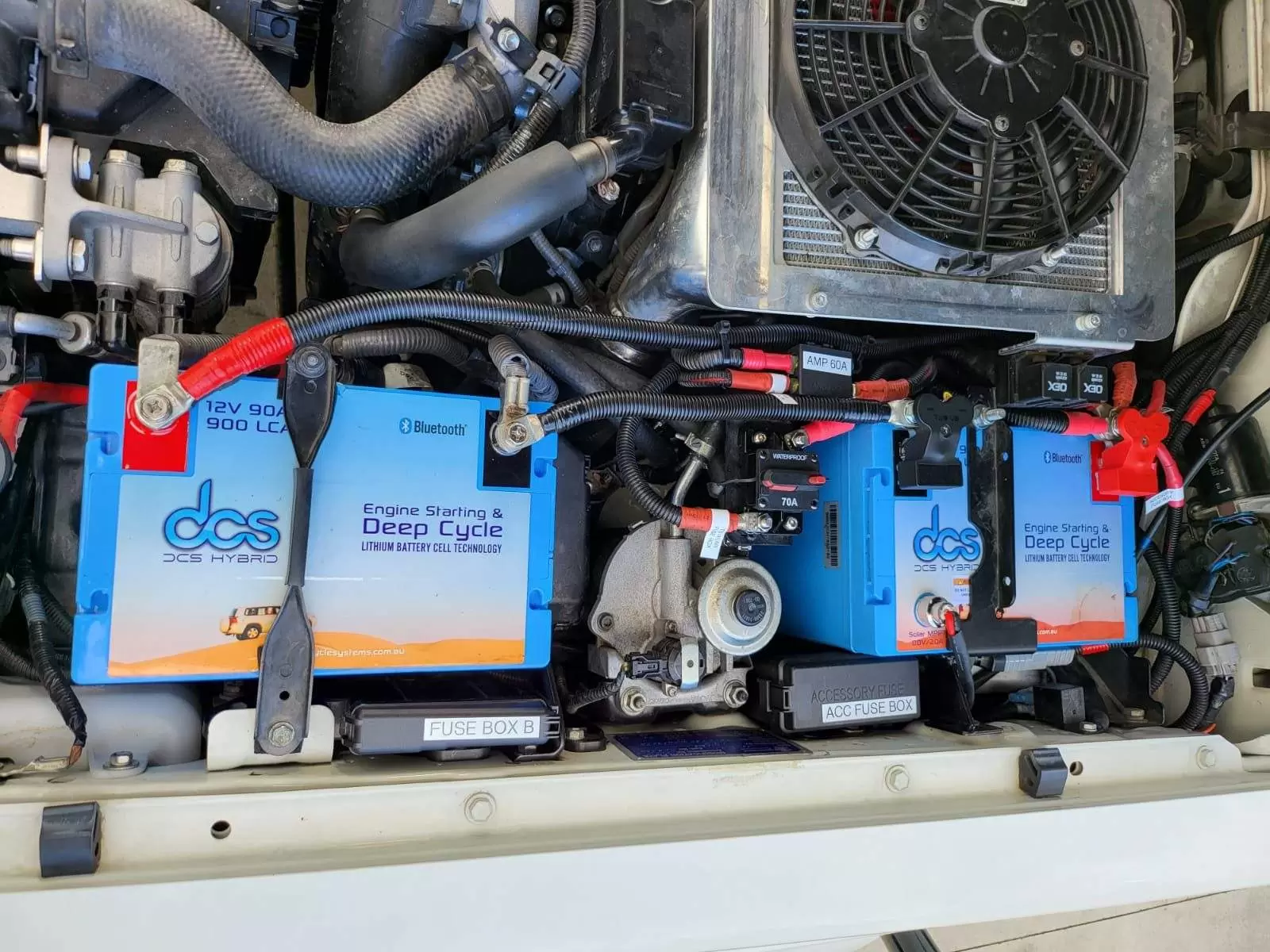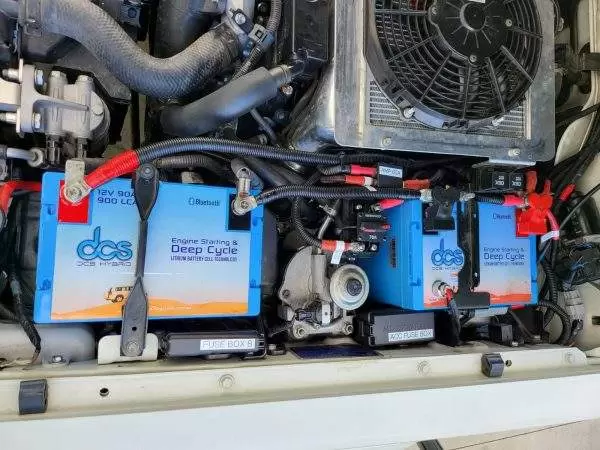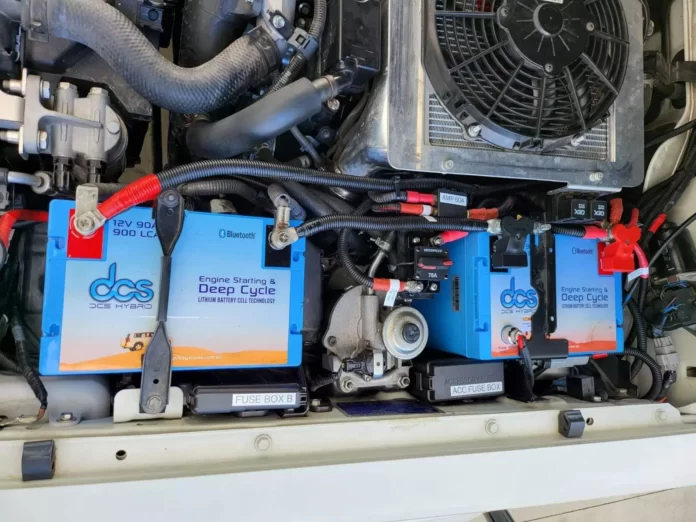Lithium ion batteries are widely used in vehicles, consumer electronics and industrial applications. While they’re not as well-known as lead-acid or NiMH batteries, lithium ion produces more power. Than these other types of batteries while being lighter. Than them as well. The biggest disadvantage of lithium ion batteries is that they cost much more. Than flooded lead-acid batteries or NiMH ones do. However, there’s a good reason for this: their lifespan is longer. Lithium Dual Battery System runs cooler and they can get recharged many times over without losing any capacity (unlike flooded lead-acid). Wiring these types of batteries is pretty straight forward since you only need to connect them together in parallel.
If a 12V 150AH Dual Battery is about to use in place of a flooded lead-acid battery. How would it be wired?
One of the most common ways to wire 12V Lithium Dual Battery Setup in Australia would connect them in parallel. This means that all the batteries are get connected together and then hooked up to your load, solar panel, or charging system.
Connecting multiple batteries in series is another way that people can wire their lithium ion battery bank in Australia. This setup allows them to charge at a higher voltage and also prevents overcharging by isolating each battery from one another when they get fully charged.
 Since the LiFePO4 Battery fully charges to ~14.6 volts and since it has a resting voltage of 12.8 volts. Do I plug my devices directly (12v TV) into the terminals on the lithium battery?
Since the LiFePO4 Battery fully charges to ~14.6 volts and since it has a resting voltage of 12.8 volts. Do I plug my devices directly (12v TV) into the terminals on the lithium battery?
The Lithium Ion Dual Battery System will not get damaged if you connect it to a device with a higher voltage. However, the device may not work properly and you could damage it. If you connect a device that has a lower voltage. Than the one in your lithium battery. Then this can also damage the device as well as cause an explosion in your house or car!
You should always set the voltage of your lithium ion battery to match the specifications of your devices. So that they don’t get damaged and. So that you can get the most out of them! This will help make sure it’s charged enough when needed but doesn’t waste energy unnecessarily by overcharging either before use. While being used by appliances like TVs which require more power. Than just simple lights might need!
What wiring is required between a solar panel and a lithium battery?
To wire a 12V Lithium Dual Battery Kit, connect the positive wire from the solar panel to the positive terminal on your battery. Then connect another positive wire from your load (i.e., lights, TV) to the negative terminal on your battery. There is no need for an additional ground wire as both types of batteries use lithium ion technology and therefore don’t require a ground connection.
How do you charge a 12V lithium ion battery with a solar panel?
- A charge controller is needed.
- The solar panel needs to be matched to the battery.
- The solar panel needs to be matched to the charge controller.
- The charge controller needs to be matched with your Lithium Dual Battery Kit. Because it regulates how much voltage goes into them and it can’t go past a certain point.
- If you’re going big, you need big wire. But if not then regular wire will do just fine (usually).
What is the lowest voltage at which to recharge a lithium-ion battery?
Lithium-ion batteries should get recharged when their voltage drops below 3.0V/cell or 3.2V/cell for a 12-volt battery system. To determine the lowest voltage at which to recharge a Lithium Battery for Dual Battery System. Use a multimeter set to measure DC voltage and set it on its highest resistance range (not AC). Connect one probe to your cell and the other probe to ground or another metal point inside your pack. Don’t connect it directly to the positive terminal.. Because this will cause damage due to internal shorting of the cells.
The maximum voltage at which you can charge your battery. It depends on how much current is available from your charger and where you are in the cycle of its discharge curve. A good rule of thumb is that if you can push more. Than 1C into your cell directly after use (1C = 100mA) then it’s time to stop charging!
What is the best way to connect multiple LiFePo4 batteries in parallel?
There are a few ways to connect LiFePo4 batteries together. The most common is connecting them in parallel. Which simply means that the positive terminals of each battery are get connected and then they’re all get connected to the negative terminal. This is great for increasing usable capacity and charging speed. But it doesn’t help with balancing cells within your pack since any difference will result in one cell taking more charge. Than another over time.
Connecting Dual Battery System Lithium in series helps balance out their voltages by adding them together while still allowing you to use the full capacity of each pack individually. Unfortunately, there isn’t much room for growth here since this can quickly get complicated when dealing with large numbers of batteries—especially if you want them all in parallel!
Does it matter which type of 12V lithium iron phosphate marine battery I use for my RV house batteries?
It really depends on your needs. For example, if you are looking to power your RV house batteries and want a robust Lithium Dual Battery Systems that will last longer. Than a traditional lead acid battery. Then a 12V Lithium ion marine battery may be more suitable for this application.
On the other hand, if you are just looking to power one or two lights such as a porch light at home or in an office space then perhaps it would get better suited to use something like our 12V Deep Cycle Battery with its higher capacity and longer life cycle.
Wiring of these batteries is pretty straight forward, however you need to understand the limitations and special requirements of these batteries.
Wiring of these batteries is pretty straight forward, however you need to understand the limitations and special requirements of these batteries.
You need to be aware that these batteries have a very different electrical profile. Than traditional lead-acid or NiMH battery banks. These are lithium ion (LiON) cells which operate at a much lower voltage. Than traditional lead-acid or NiMH batteries. Lithium Dual Battery System cells can get charged above their recommended maximum voltage and will continue to accept charge current until they reach their minimum voltage for safe storage. This is referred to as overcharge protection. Overcharging lithium ion cells can cause them to heat up beyond their normal operating temperature causing damage or even fire if not carefully monitored by a suitable charger/converter system.
Conclusion
Wiring of the Lithium Dual Battery System is pretty straight forward. However you need to understand the limitations and special requirements of these batteries.
If you’re looking for a reliable and durable battery bank, look no further than the Lithium Dual Battery System. The LiFePo4 dual battery is perfect for anyone who wants to go off-grid and have peace of mind that their batteries will work at any time. Not only that, but these batteries are also more powerful than your traditional lead-acid ones so they can last longer without being damaged!
Need a reliable and durable Lithium Dual Battery Setup?
The lithium batteries are more durable than lead acid batteries. The lithium battery has a higher discharge rate and it can be charged for longer periods without damage. A Lithium Dual Battery Setup is much safer than the lithium ones, as they don’t carry any risk of fire or explosion. However, it is important to note that if you leave your car unused for too long after charging your car battery, then there may be problems with starting it again due to electrolyte stratification (an effect caused by electrolytes separating into layers).
The main advantages compared with lead-acid batteries include having a longer lifespan (up to 3 times longer), being lighter in weight (a person can carry up to 200 lbs.), being smaller in size (length x width x height) which makes them easier to handle in some situations and less expensive overall because they do not require replacement as often.
Worrying about dual battery system off-grid? Get high-performance Lithium Dual Battery Kit
If you’re tired of worrying about your dual battery system when you go off-grid, it may be time to consider Lithium Dual Battery Kit. While lead acid batteries are more common in the RV industry and can be used in a dual battery system, they’re heavier than lithium batteries. Lithium power packs also offer more functionality, efficiency and longevity than their lead acid counterparts.
Lithium Ion Dual Battery System is the best way to go for dual battery setups
Before the commercial success of LiFePo4 batteries, the most common battery type was lead acid battery. Lead acid batteries tend to be heavier, while lithium batteries weigh less. However, the Lithium Ion Dual Battery System is more efficient and durable than lead acid ones—and they can also be charged quicker (within one hour).
Lithium batteries have a higher power density than their lead-acid counterparts which means that they pack more energy into a smaller space. This makes them far better for use with high-powered applications such as motorboats or jet skis where you need a lot of power but don’t have room for heavy equipment.
The main differences between the two are as follows:
- Lithium Batteries Are More Efficient
- No Memory Effect
- Zero Maintenance
- No Ventilation like Lead-acid batteries
- High charge and discharge speed
- Even discharge voltage due to integrated Battery Management System
- Increased Depth of Discharge
- Higher Charge efficiency
- 5X the lifespan of a lead-acid battery
- Lower long-term cost
 Lithium Dual Battery Systems have become first choice for vehicle owners
Lithium Dual Battery Systems have become first choice for vehicle owners
For many years, lead acid batteries have been the standard for RV, caravans and boat owners, but now the Lithium Dual Battery Systems have become a popular choice. In the past, lithium batteries were considered to be expensive and only used in high-end cars. However, recent improvements in technology have made them more accessible to consumers.
The cost of lithium batteries has fallen significantly over time while their performance has improved dramatically. They are now lighter than lead acid batteries so they can also be installed more easily into your vehicle or boat.
Dual Battery System Lithium is much more powerful
A Dual Battery System Lithium is much more powerful than the traditional lead-acid type. It can provide twice as much power and last longer, which makes it ideal for off-grid use. It not only works well in homes with a solar energy system but also in cars, boats and other vehicles. This type of battery comes with many benefits that make it worth investing in over traditional lead-acid batteries:
Complete Discharge of a Lead-acid batteries is harmful
This also means that when they’re drained too much, they become damaged and can even be ruined. This is because lead-acid batteries are made of thin sheets of lead which form a grid in an acid solution. The amount of charge in these batteries depends on their thickness. When you drain the battery too much, its capacity to hold a charge decreases due to corrosion or oxidation—both bad things for your battery!
Lithium ion batteries don’t have this problem and can last longer as well.
The primary advantage of a lithium ion battery over its lead acid counterpart is that it doesn’t suffer from sulfation. Sulfation is a condition that occurs when the lead sulfate crystals in the battery grow too large and prevent the battery from producing electricity. This problem can be solved with an equalizing charge, but this only works for so long before your batteries become completely unusable. With lithium ion batteries, on the other hand, you don’t have to worry about sulfation because they don’t contain any lead in them at all!
In addition to being more durable than their lead acid counterparts, lithium ion batteries are also more reliable because they don’t require regular maintenance like lead acid batteries do (e.g., water checks).
Lithium Battery For Dual Battery System is safe and less hazardous
Many people are moving away from lead-acid batteries and towards Lithium Battery For Dual Battery System because they are safer to use and less potentially hazardous. The reason for this is that lithium batteries have a longer lifespan than lead-acid ones, which means that they can be used for a longer period of time before they need to be replaced. They also have a lower self-discharge rate, so they don’t lose their charge as quickly as lead-acid batteries do. Furthermore, lithium batteries are lighter and more compact than lead-acid ones (meaning you can fit them into smaller places).
Lithium batteries are the best solution for staying off grid!
Lithium batteries are the best solution for staying off grid. They are more powerful than lead acid batteries, last longer, safer and lighter weight.
Lithium batteries have a high energy density which means that they can hold a lot of energy in a small space. This makes them perfect for powering equipment like laptops or even cars because you don’t have to carry around so much weight when you’re on the go!
When it comes to storing electricity at home, lithium batteries are ideal because they don’t have any gas inside them like lead acid does; this means there’s no risk of corrosion from wet surfaces or leaking if something breaks open during transport (this happens quite often). Lithium also has an extremely low self-discharge rate compared with other types of battery which means that once charged up properly then stored away safely until needed again next time around – meaning less money spent on buying new ones every single month!”
Conclusion
If you’re looking for an alternative to lead-acid batteries, then consider getting yourself a lithium dual battery system. They are the best way to go if you want something reliable and durable. You can trust these batteries to last longer and be more efficient than their predecessors.
Related Website
Articles on intellectblogs
Articles on yycblogs
Articles on thebigblogtheory
Articles on blogs-hunt
Articles on blogsrain

